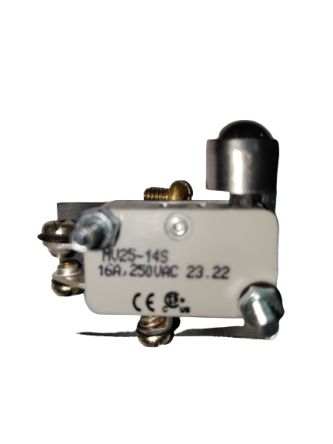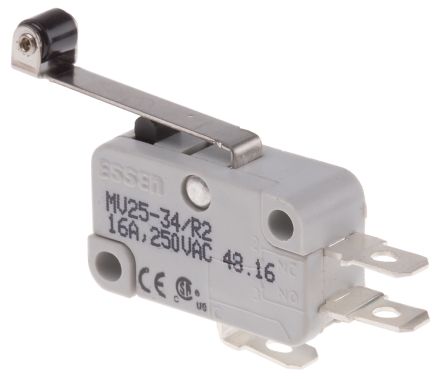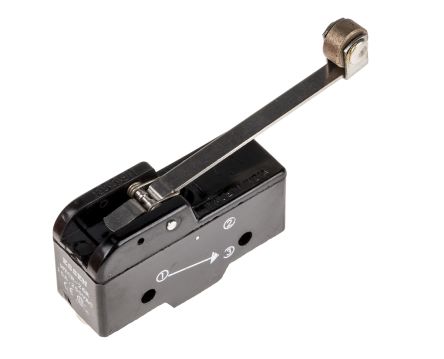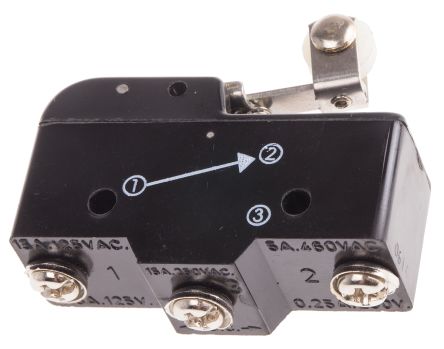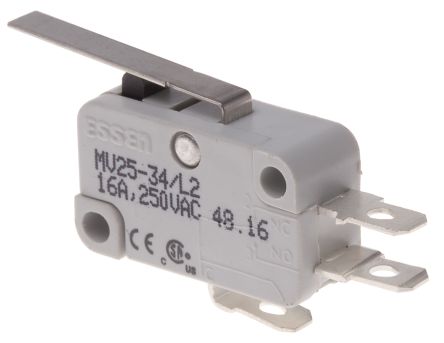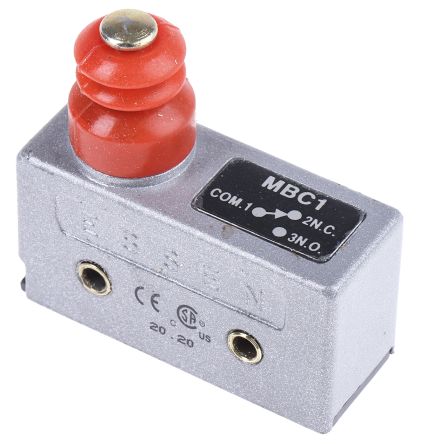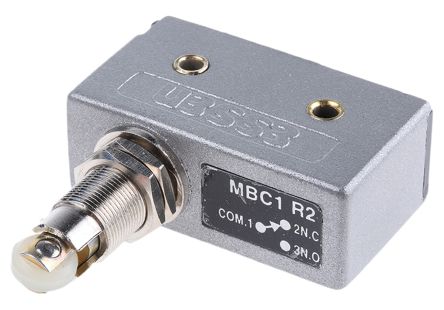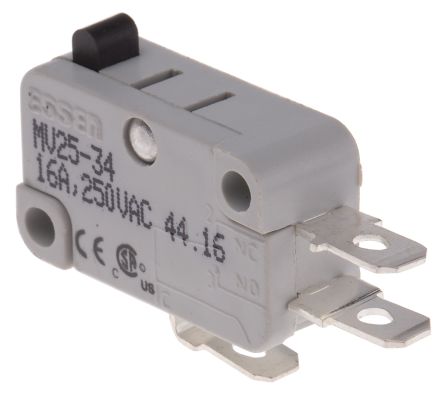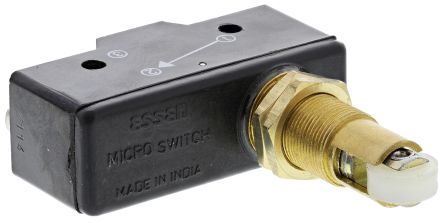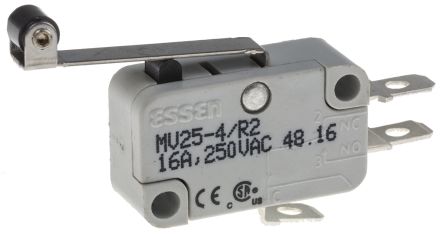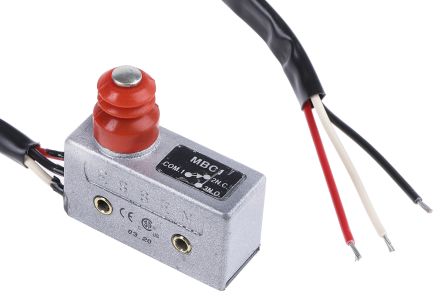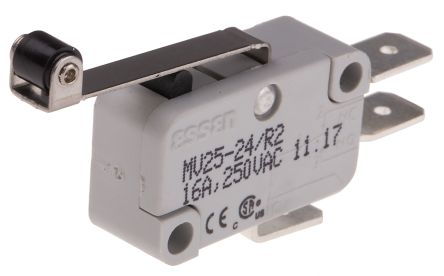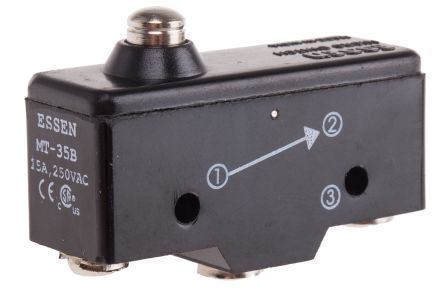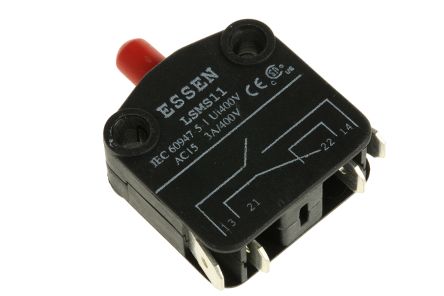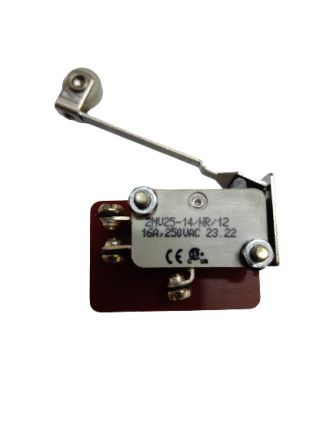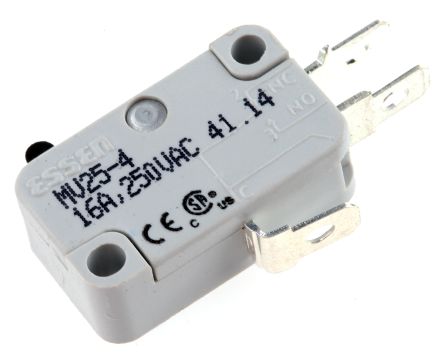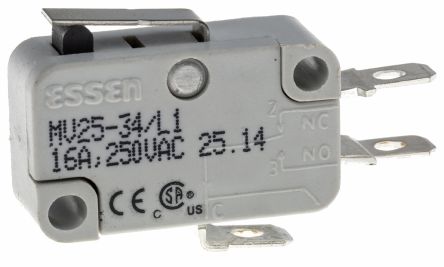- Automation & Control Gear
- Cables & Wires
- Enclosures & Server Racks
- Fuses & Circuit Breakers
- HVAC, Fans & Thermal Management
- Lighting
- Relays & Signal Conditioning
- Switches
- Batteries & Chargers
- Connectors
- Displays & Optoelectronics
- ESD Control, Cleanroom & PCB Prototyping
- Passive Components
- Power Supplies & Transformers
- Raspberry Pi, Arduino, ROCK, STEM Education & Development Tools
- Semiconductors
Micro Switches
Micro switches, also known as snap action switches, are mechanically operated electrical switches designed with an actuator and terminals labelled as common, normally open, and normally closed. They operate using a spring-loaded lever to open and close a set of internal contacts within the switch. They are also known for their precise and reliable performance, making them ideal for a wide range of applications.
Micro switches come in various configurations, including different terminal types, contact current ratings, contact configurations, IP ratings, voltage ratings (such as 12V micro switches), mechanical life spans, actuating forces, release forces, pretravel and overtravel distances, and movement differentials.
How does a micro switch work?
A micro switch typically has three terminals: common (COM), normally open (NO), and normally closed (NC). Power is usually connected to the common terminal. In its resting state, the spring inside the switch touches the normally closed terminal, allowing power to flow from the common terminal to the normally closed terminal. When the actuator is pressed or moved, the spring shifts, breaking the connection with the normally closed terminal and connecting to the normally open terminal. This action completes the circuit, allowing power to flow from the common terminal to the normally open terminal. This snap-action mechanism ensures precise and quick switching with minimal physical movement.
Where would you find micro switches?
Micro switches are commonly used in a variety of applications due to their reliability, low cost, and precise switching capabilities. They are often employed as safety devices, preventing machines from operating under unsafe conditions.
For example, in household appliances like microwave ovens, micro switches are used in on-off setups to ensure that the door is closed before the oven can be activated. In industrial settings, micro switch limit switches are used to detect the position of components, control machinery operations, and ensure safety protocols are met. They are also found in automotive systems, medical devices, and security systems. For applications requiring moisture resistance, waterproof micro switches are available, offering protection against water ingress and ensuring reliable operation in wet conditions.
Micro Switch Actuator Types
Micro switches come in various actuator types, each suited to different applications and operating principles. The common actuator types include:
- Plunger Actuator: A simple push-button mechanism that activates the switch when pressed.
- Button Actuator: Similar to the plunger but designed for more precise activation with a smaller contact surface.
- Roller Actuator: Features a roller on the end of the actuator lever, ideal for applications involving sliding or rotating parts.
- Lever Actuator: These micro switches use a long lever to increase the force applied, suitable for applications requiring minimal actuation force.
What is the mechanical operating life of a micro switch?
The mechanical operating life of a micro switch is generally very high, often measured in millions of cycles. This longevity makes them suitable for applications where frequent switching is required. Consumer products typically have micro switches with a lower mechanical life compared to industrial products, but upgrading to switches with higher life expectancies is straightforward and cost-effective. For example, industrial micro switches can have mechanical lifespans exceeding 10 million cycles, ensuring reliable performance over long periods.
What type of applications need micro switches?
Micro switches are used in both consumer and industrial applications due to their reliability and precise operation. Common applications include:
- Door Interlocks: Ensuring appliances like microwaves and washing machines operate only when the door is securely closed.
- Safety Switches: Used in elevators and machinery to prevent operation under unsafe conditions.
- Control Circuits: Found in industrial equipment to detect the position of components and control operations.
- Levelling Devices: Used in vending machines and other equipment to maintain balance and proper function.
- Flow Measurement: Employed in precise equipment to measure the flow of air or gases.
Buying Micro Switches: Ordering & Delivery Information for Australia
RS is a trusted supplier and distributor of high-quality micro switches from leading brands such as RS PRO, Honeywell, Omron, Panasonic, and TE Connectivity. Our extensive catalogue includes a wide variety of micro switches to meet diverse needs, from industrial control systems to consumer electronics. When selecting micro switches, consider specifications such as terminal type, contact current rating, and movement differential to ensure compatibility with your application. Detailed product descriptions and datasheets are available to help you make informed decisions.
RS Group offers fast and reliable delivery of micro switches and other electronic components across Australia. Our delivery services are designed to ensure you receive your products promptly and efficiently. For more details on delivery services and fees, please refer to our Delivery Page.
Popular Searches
Related links
- Micro Switch Actuators
- RS PRO Roller Lever Micro Switch 15 A @ 250 V ac, SP-CO
- RS PRO Long Roller Lever Micro Switch 16 A @ 250 V ac, SP-CO
- Honeywell Roller Lever Micro Switch 5 A, SP-CO
- Honeywell Roller Lever Micro Switch 6 A IP40
- Honeywell Roller Lever Micro Switch 15 A, SP-CO
- Panasonic Roller Lever Micro Switch 5 A @ 250 V ac, SP-CO
- CAMDENBOSS Simulated Roller Lever Micro Switch 5A, SPDT
